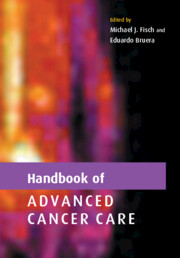Book contents
- Frontmatter
- Contents
- List of contributors
- Preface
- Acknowledgements
- PART I General concepts in oncology
- Part II Primary tumors
- 17 Lung cancer
- 18 Breast cancer
- 19 Colorectal cancer
- 20 Prostate cancer
- 21 Pancreatic and hepatobiliary cancer
- 22 Anal cancer
- 23 Esophageal and gastric cancer
- 24 Head and neck cancer
- 25 Kidney cancer
- 26 Bladder cancer
- 27 Ovarian cancer
- 28 Gynecologic malignancies: endometrial and cervical carcinoma
- 29 Testicular cancer
- 30 Unknown primary site cancer
- 31 Mesothelioma
- 32 Adult soft tissue sarcoma
- 33 Osteosarcoma and Ewing's sarcoma
- 34 Melanoma
- 35 Primary brain tumors
- 36 Thyroid and adrenal cancer
- 37 HIV-related cancer
- 38 Hodgkin's and non-Hodgkin's lymphoma
- 39 Leukemia, myelodysplastic syndrome and myeloproliferative disorder
- 40 Multiple myeloma
- Part III Management of specific symptoms and syndromes
- Index
- References
20 - Prostate cancer
Published online by Cambridge University Press: 04 August 2010
- Frontmatter
- Contents
- List of contributors
- Preface
- Acknowledgements
- PART I General concepts in oncology
- Part II Primary tumors
- 17 Lung cancer
- 18 Breast cancer
- 19 Colorectal cancer
- 20 Prostate cancer
- 21 Pancreatic and hepatobiliary cancer
- 22 Anal cancer
- 23 Esophageal and gastric cancer
- 24 Head and neck cancer
- 25 Kidney cancer
- 26 Bladder cancer
- 27 Ovarian cancer
- 28 Gynecologic malignancies: endometrial and cervical carcinoma
- 29 Testicular cancer
- 30 Unknown primary site cancer
- 31 Mesothelioma
- 32 Adult soft tissue sarcoma
- 33 Osteosarcoma and Ewing's sarcoma
- 34 Melanoma
- 35 Primary brain tumors
- 36 Thyroid and adrenal cancer
- 37 HIV-related cancer
- 38 Hodgkin's and non-Hodgkin's lymphoma
- 39 Leukemia, myelodysplastic syndrome and myeloproliferative disorder
- 40 Multiple myeloma
- Part III Management of specific symptoms and syndromes
- Index
- References
Summary
Prostate cancer is the most common male malignancy in the US. In the year 2000 there were approximately 180 400 new cases of prostate cancer with approximately 31 900 deaths. Most patients present with localized disease and treatment choices include surgery, radiation (external beam or brachytherapy), or observation. It is well recognized that a minority of patients will develop metastatic disease after definitive local therapy or present with metastatic disease. Some of these patients will have a very indolent course and not die of prostate cancer, whereas others will have aggressive disease that will metastasize from the prostate gland and be the cause of the patient's death. Progression is often first manifest by an increasing prostate-specific antigen (PSA). The mere presence of an elevated PSA after definitive local therapy does not portend a poor outlook. For example, in one series of 315 patients who underwent a prostatectomy it was noted that the median survival was more than 10 years if the PSA rose 2 years after the surgery, took longer than 10 months to double and the Gleason's score was 7 or less.
However, survival is shorter once patients have visible metastases on radiographic imaging and/or symptomatic lesions. Standard initial therapy for metastatic disease consists of androgen ablation. Dr. Huggins won the Nobel prize in medicine for his discovery that prostatic epithelium will undergo atrophy with withdrawal of androgen stimulation.
- Type
- Chapter
- Information
- Handbook of Advanced Cancer Care , pp. 171 - 177Publisher: Cambridge University PressPrint publication year: 2003

